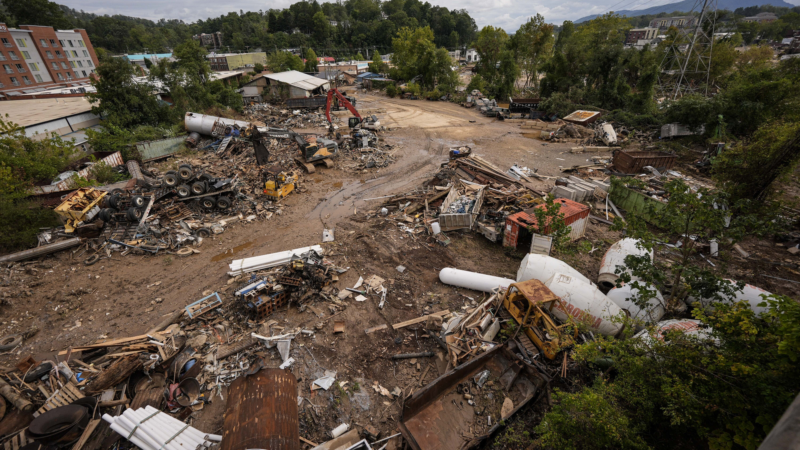Fact checking falsehoods about FEMA funding and Hurricane Helene
Rumors, misinformation and lies about the federal government’s response to Hurricane Helene in the southeastern United States have run rampant since the storm made landfall, especially around funding for the Federal Emergency Management Agency.
The claims have become so widespread that FEMA set up a response page to debunk many falsehoods around how disaster funding works and what the agency’s response has been.
As of Sunday, FEMA says it has provided more than $137 million in assistance to six states in the southeast, including 7,000 federal personnel, nearly 15 million meals, 14 million liters of water, 157 generators and more than half a million tarps.
The agency also says more than 3,000 North Carolina residents have been rescued or supported by more than 1,200 urban search and rescue personnel, with recovery efforts aided by National Guard and active-duty troops. North Carolina has also received $100 million in federal transportation funds to rebuild roads and bridges washed out by the storm.
Republicans, especially former President Donald Trump, have sought to wield the storm as a political tool against Vice President Harris with less than a month to go before Election Day. Trump has repeatedly attacked Harris and President Biden as doing a “bad job” handling the storm’s aftermath without specifics, instead using misleading math to complain about immigration and foreign aid.
“They’re offering them $750 to people whose homes have been washed away,” Trump said Saturday at a rally in Butler, Pa. “And yet we send tens of billions of dollars to foreign countries that most people have never heard of. They’re offering them $750. They’ve been destroyed. These people have been destroyed.”
The $750 Trump refers to is what’s called Serious Needs Assistance, an initial direct relief payment intended to help cover emergency supplies like food, water, baby formula and other basics
The serious needs assistance is one of many changes to FEMA’s individual assistance programs that took effect earlier this year, along with displacement assistance to cover immediate housing needs while residents sort out long-term options. FEMA assistance also covers storm-related damage to homes and personal property.
Is FEMA running out of money?
Another popular refrain that has gained traction on the right in recent days is the claim that FEMA has no money for hurricane recovery because of money spent on migrants, something that is not true.
The money used in the aftermath of Helene and other major disasters is not part of FEMA’s operating budget, but instead comes from the Disaster Relief Fund, which is appropriated by Congress.
Last week, Homeland Security Secretary Alejandro Mayorkas reportedly said the agency “does not have the funds to make it through” the rest of hurricane season.
FEMA is required to share monthly status reports on the DRF, and before the end of the fiscal year the agency had to implement “Immediate Needs Funding” that puts a pause on some of the agency’s spending that is not tied to lifesaving and life-sustaining efforts when the needs of the DRF could be more than the remaining balance.
The most recent report that runs through August showed a projected deficit by the end of September — and that’s before Helene made landfall.
October is the start of the federal government’s fiscal year, and a stopgap spending measure approved by lawmakers last month replenished the DRF at last year’s baseline level of $20 billion, though some of that money is reserved for ongoing recovery efforts from previous disasters and projects to mitigate future impacts.
Could FEMA’s Disaster Relief Fund get more money soon?
The DRF is often considered the first line of response while FEMA and other agencies assess the damage and needs related to a specific disaster. Once that information is compiled, the president typically sends a formal request to Congress for supplemental appropriations to provide more closely tailored funding and programs for any given response.
Congress has not yet passed supplemental funding for other disasters that occurred earlier in the year, much to the frustration of members in communities recovering from floods, fires and other major events. Even if they had approved the existing funding request, the money would not have been directed to Helene relief since the storm damage happened after Congress left Washington at the end of September.
Lawmakers could return to Washington to try to pass more aid but they are waiting for the White House to send an updated funding request. President Biden wrote a letter to Congress last week that said FEMA “has the resources needed for the immediate emergency response phase.”
Biden went on to say an updated request is on its way.
“My Administration will keep the Congress apprised of efforts to assess the full resource requirements associated with Hurricane Helene, including for long-term rebuilding and resilience efforts, as those estimates become available,” he wrote.
One continuing resolution proposed in the House last month would have included an additional $10 billion for the fund, but that version failed because it was tied to a controversial Republican-backed election bill that focused on further cracking down on already-illegal non-citizen voting.
Trump uses immigration attacks to make more false claims
An August report from the Department of Homeland Security Inspector General argues that billions of dollars earmarked for disasters that occurred more than a decade ago could be returned to the Disaster Relief Fund.
But the false argument from Trump and other Republicans has been that the Biden administration diverted disaster money to take care of migrants.
“They stole the FEMA money, just like they stole it from a bank, so they could give it to their illegal immigrants that they want to have vote for them this season,” Trump said in Michigan last week.
Non-citizens cannot vote in the election, and no disaster funds have been diverted. Instead, Trump and his allies are referring to the Shelter and Services Program that saw FEMA disseminate hundreds of millions in grants from Customs and Border Protection to municipalities that saw an influx of migrants.
That program was a separate funding source with a separate purpose covering separate years – and not relevant to the current hurricane recovery efforts.
Meanwhile, Republican House Speaker Mike Johnson said Sunday he had no plans to bring lawmakers back from recess before the election to address requests for additional disaster relief as Hurricane Milton approaches the Florida coast as a Category 5 storm.
Photos: A look back at the year since Oct. 7
A year has passed since the Oct. 7 attack on Israel and the start of its war in Gaza. Here's a look at some key moments from photojournalists on the ground.
How the Biden administration lost its grip on Israeli leadership
It's been one year since the Hamas attack on Israel.
Nir Oz resident says it’s ‘hard to enjoy life’ when fellow residents are still held hostage in Gaza
Irit Lahav survived the Hamas attack on her kibbutz last year. Lahav describes how Nir Oz residents are doing and whether they want to return to their homes on the border with Gaza.
One family’s loss in Gaza
Dr. Alaa Ali is a Palestinian American doctor in Dearborn, Michigan, who has a large family network in Gaza. Over the past year, he's lost more than 100 people in his immediate and extended family there.
Supreme Court ducks cases involving everything from abortion to Elon Musk
The justices also left in place a Michigan state constitutional amendment that barred the use of public funds for private schools.
Despite mixed reviews, ‘Joker 2’ is on track to be one of the biggest comic-book-film flops
Many film critics and comic book fans say they felt the sequel felt short of their expectations. Others argue that was the whole point all along.



